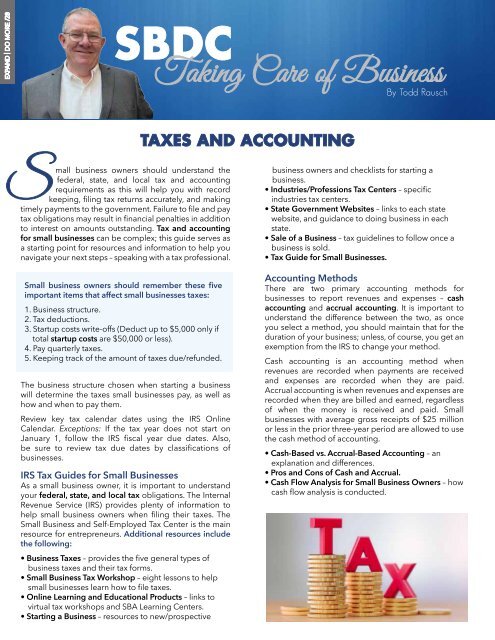Expand Magazine - Volume 6 Issue 2
Create successful ePaper yourself
Turn your PDF publications into a flip-book with our unique Google optimized e-Paper software.
EXPAND | DO MORE /28<br />
SBDC<br />
Taking Care of Business<br />
By Todd Rausch<br />
Taxes and Accounting<br />
Small business owners should understand the<br />
federal, state, and local tax and accounting<br />
requirements as this will help you with record<br />
keeping, filing tax returns accurately, and making<br />
timely payments to the government. Failure to file and pay<br />
tax obligations may result in financial penalties in addition<br />
to interest on amounts outstanding. Tax and accounting<br />
for small businesses can be complex; this guide serves as<br />
a starting point for resources and information to help you<br />
navigate your next steps – speaking with a tax professional.<br />
Small business owners should remember these five<br />
important items that affect small businesses taxes:<br />
1. Business structure.<br />
2. Tax deductions.<br />
3. Startup costs write-offs (Deduct up to $5,000 only if<br />
total startup costs are $50,000 or less).<br />
4. Pay quarterly taxes.<br />
5. Keeping track of the amount of taxes due/refunded.<br />
The business structure chosen when starting a business<br />
will determine the taxes small businesses pay, as well as<br />
how and when to pay them.<br />
Review key tax calendar dates using the IRS Online<br />
Calendar. Exceptions: If the tax year does not start on<br />
January 1, follow the IRS fiscal year due dates. Also,<br />
be sure to review tax due dates by classifications of<br />
businesses.<br />
IRS Tax Guides for Small Businesses<br />
As a small business owner, it is important to understand<br />
your federal, state, and local tax obligations. The Internal<br />
Revenue Service (IRS) provides plenty of information to<br />
help small business owners when filing their taxes. The<br />
Small Business and Self-Employed Tax Center is the main<br />
resource for entrepreneurs. Additional resources include<br />
the following:<br />
• Business Taxes – provides the five general types of<br />
business taxes and their tax forms.<br />
• Small Business Tax Workshop – eight lessons to help<br />
small businesses learn how to file taxes.<br />
• Online Learning and Educational Products – links to<br />
virtual tax workshops and SBA Learning Centers.<br />
• Starting a Business – resources to new/prospective<br />
business owners and checklists for starting a<br />
business.<br />
• Industries/Professions Tax Centers – specific<br />
industries tax centers.<br />
• State Government Websites – links to each state<br />
website, and guidance to doing business in each<br />
state.<br />
• Sale of a Business – tax guidelines to follow once a<br />
business is sold.<br />
• Tax Guide for Small Businesses.<br />
Accounting Methods<br />
There are two primary accounting methods for<br />
businesses to report revenues and expenses – cash<br />
accounting and accrual accounting. It is important to<br />
understand the difference between the two, as once<br />
you select a method, you should maintain that for the<br />
duration of your business; unless, of course, you get an<br />
exemption from the IRS to change your method.<br />
Cash accounting is an accounting method when<br />
revenues are recorded when payments are received<br />
and expenses are recorded when they are paid.<br />
Accrual accounting is when revenues and expenses are<br />
recorded when they are billed and earned, regardless<br />
of when the money is received and paid. Small<br />
businesses with average gross receipts of $25 million<br />
or less in the prior three-year period are allowed to use<br />
the cash method of accounting.<br />
• Cash-Based vs. Accrual-Based Accounting – an<br />
explanation and differences.<br />
• Pros and Cons of Cash and Accrual.<br />
• Cash Flow Analysis for Small Business Owners – how<br />
cash flow analysis is conducted.

















